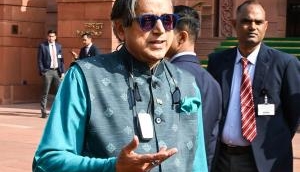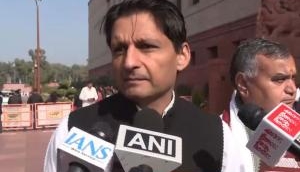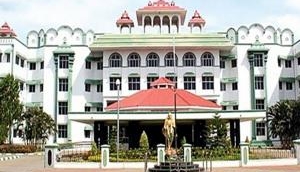
A Supreme Court bench set aside the Allahabad High Court's suo motu contempt proceedings against Outlook journalists who had covered the Ghaziabad Provident Fund scam in 2008.
The bench comprising Justices Kurian Joseph and Rohinton Fali Nariman had given its judgement on 30 June but was made available online only on 6 July.
According to The Wire, the Allahabad High Court had accused Outlook group's former publisher Maheshwer Peri, and journalists Bishwadeep Moitra and Chandrani Benerji of contempt of court. Proceedings against Vinod Mehta, former editor of Outlook, who was also an accused in this case, ceased with his demise.
The Supreme Court had stayed the proceedings in the high court in 2015 after a special leave petition was filed by Peri and others over a procedural aspect.
Outlook had published an article by Banerji about the PF scam in its 10 November 2008 edition and had named some judges who were allegedly involved in it.
Two lawyers of Allahabad high court, Manoj Kumar Srivastava and Veer Singh, filed an application against Peri, Mehta, Banerji and Moitra seeking initiation of suo motu contempt proceeding for lowering the authority of the higher judiciary.
According to the report, the case was listed before a division bench of the high court only in 2012 and the court initiated suo motu contempt proceedings against the accused on 28 April 2015, around seven years after the article was published .
The high court saw the case fit to take suo motu action and directed the registry not to name the petitioner in the cause list as it held that the publication caused great insult to the higher judiciary, lowering its authority and the remarks made in the article were derogatory.
Under the Contempt of Courts Act, 1971 an application by any person drawing court's attention towards contempt must be accompanied by the consent of the advocate general or a law officer, specified by the Central government under Section 15 of the Act, which was missing in this particular case. Hence, the high court had to justify the proceedings by invoking its suo motu jurisdiction.
The bench issued notices to the accused and directed them to appear in person before the court.
Aggrieved by the order, the accused approached the Supreme Court to set aside the high court's notice for violating the period of limitation fixed in Section 20 the Contempt of Courts Act, which prescribes a one-year period of limitation to initiate any proceedings of contempt, suo motu or otherwise.
In response, the high court contended before the Supreme Court that since it had initiated action (issuing a notice) under Article 215 of the constitution, the genesis of which was the application filed by Srivastava and Singh (dated November 18, 2008) that was considered within one year, it had not violated the period of limitation. The high court sought to take advantage of its consideration of the lawyers' application to buttress its view that it did not violate Section 20 of the Act, despite it having treated the application as invalid (in view of the failure to secure the advocate general's consent) and converting it to a suo motu proceeding.
In its June 30 judgement, the Supreme Court said:
The application filed by the advocates, and which is referred to in the impugned order, is without the consent in writing of the Advocate General. The only application other than by the Advocate General, contemplated under Section 15 of the Act, is the motion made by any person with the consent in writing of the Advocate General. Being a jurisdiction which, when exercised, is fraught with serious consequences, the Parliament has thought it justifiably fit to provide for such safeguards. Thus, the impugned article, having been published on 10.11.2008 and the High Court having initiated the suo motu action only on 28.04.2015, the same is hit by the limitation of one year prescribed under the Act. In that view of the matter, it has become unnecessary for us to deal with the submissions on merits as to whether the contents of the article would constitute criminal contempt or not. Accordingly, the appeal is allowed and the impugned order is set aside.
Justice Nariman also told the counsel: "If the object (of the article alleged to have caused contempt of court) is to expose the wrong within the judiciary, then there is nothing wrong with the article, and the accused could not be said to have committed contempt of court."
The Ghaziabad PF scam pertained to alleged siphoning-off of over Rs 6 crore from the PF accounts of class 3 and 4 employees of the Ghaziabad district court.
Six district judges, two of whom later became high court judges, were among 76 accused in the case. The CBI, as directed by the Supreme Court, investigated and filed a chargesheet in the case in 2010 and the trial is still inconclusive.
First published: 7 July 2016, 21:01 IST






![BJP's Kapil Mishra recreates Shankar Mahadevan’s ‘Breathless’ song to highlight Delhi pollution [WATCH] BJP's Kapil Mishra recreates Shankar Mahadevan’s ‘Breathless’ song to highlight Delhi pollution [WATCH]](https://images.catchnews.com/upload/2022/11/03/kapil-mishra_240884_300x172.png)

![Anupam Kher shares pictures of his toned body on 67th birthday [MUST SEE] Anupam Kher shares pictures of his toned body on 67th birthday [MUST SEE]](https://images.catchnews.com/upload/2022/03/07/Anupam_kher_231145_300x172.jpg)






